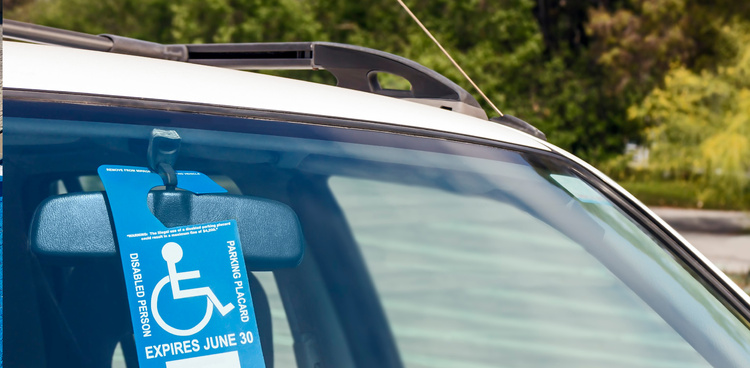
Exploring the Different Types of Handicap Placards in Florida
Introduction
Handicap placards play a crucial role in providing accessibility and convenience for individuals with disabilities. In Florida, there are several types of handicap placards available, each serving a specific purpose. Understanding these different types of placards is essential for individuals with disabilities and their caregivers. In this comprehensive guide, we will explore the various types of handicap placards in Florida, their eligibility criteria, benefits, and application process. Let's delve into the world of handicap placards and discover the options available for individuals seeking improved accessibility and mobility.
Standard Handicap Placard
Eligibility and Benefits
The standard disability tag, also known as a permanent disability placard, is available to individuals who have a qualifying disability. According to the Florida Department of Highway Safety and Motor Vehicles (DHSMV), an individual is considered eligible for a standard disability tag if they have a condition that limits or impairs their ability to walk or requires the use of a mobility aid such as a wheelchair, cane, crutches, or walker. This type of placard is designed for individuals with long-term disabilities.
The benefits of a standard disability tag are numerous. It allows individuals with disabilities to park in designated accessible parking spaces, ensuring they have closer access to buildings and facilities. This convenience improves accessibility and reduces physical strain for those with mobility challenges.
Application Process
To apply for a standard handicap permit in Florida, you will need to complete an application form provided by the DHSMV. The application form can be obtained online through the DHSMV website or at a local tax collector's office. The form requires personal information, including your name, address, and driver's license number.
Additionally, you will need to provide medical certification from a licensed healthcare practitioner, physician, or advanced practice registered nurse. The medical certification must state the nature of your disability and its impact on your mobility. It is important to ensure the medical certification is completed accurately and provides sufficient information to meet the eligibility criteria.
Renewal and Expiration
Standard disability tags in this state are valid for up to four years. The expiration date is indicated on the placard, and it is the responsibility of the placard holder to renew it before the expiration date. Renewal can be done online, by mail, or in person at a local tax collector's office.
It is important to note that a standard disability tag can be revoked if the placard holder no longer meets the eligibility criteria or if the placard is being misused. Misuse of a disability tag is a serious offense and can result in fines and penalties.
Permanent Handicap Placard
Eligibility and Benefits
The permanent disability sign is similar to the standard placard and is intended for individuals with long-term disabilities. To qualify for a permanent placard, an individual must have a condition that significantly impairs their mobility or requires the use of assistive devices. This includes conditions such as paralysis, severe arthritis, respiratory diseases, and cardiovascular impairments.
The benefits of a permanent disability sign are similar to those of a standard placard. It allows individuals to park in designated accessible parking spaces, providing them with closer access to buildings and facilities. This improves accessibility and enhances the overall quality of life for individuals with disabilities.
Application Process
To apply for a permanent handicap placard in Florida, you will need to follow a similar process as for a standard placard. Complete the application form provided by the DHSMV, ensuring accurate and up-to-date personal information. Additionally, you will need to obtain medical certification from a licensed healthcare practitioner or physician that clearly states the nature of your disability and its impact on your mobility.
Submitting a thorough and accurate medical certification is essential for obtaining a permanent disability sign. The certification should provide sufficient details to meet the eligibility requirements and facilitate the application process.
Renewal and Expiration
Similar to the standard placard, the permanent disability sign is valid for up to four years. It is important to renew the placard before the expiration date to ensure continued accessibility benefits. The renewal process can be done online, by mail, or in person at a local tax collector's office. Remember that misusing a handicap placard or failing to renew it on time can result in penalties and fines.
Temporary Handicap Placard
Eligibility and Benefits
The temporary disability sign is designed for individuals who have a temporary disability or impairment that affects their mobility. This type of placard is ideal for individuals recovering from surgeries, injuries, or medical conditions that limit their mobility for a specific period.
To be eligible for a temporary disability sign, you must have a qualifying temporary disability that affects your ability to walk or requires the use of assistive devices. This includes conditions such as fractures, sprains, surgeries, and pregnancy complications.
The benefits of a temporary disability sign are significant during the recovery phase. It allows individuals to park in designated accessible parking spaces, making it easier to access medical facilities, stores, and other public places without exerting excessive physical strain.
Application Process
The application process for a temporary handicap placard is similar to that of a standard or permanent placard. Obtain the application form from the DHSMV website or a local tax collector's office, ensuring all personal information is accurately filled out.
You will also need to provide medical certification from a licensed healthcare practitioner or physician, clearly stating the nature of your temporary disability, expected duration, and impact on your mobility. The medical certification should be recent and provide sufficient details to support your application.
Renewal and Expiration
Temporary handicap placards are valid for a maximum of six months. If your temporary disability extends beyond six months, you will need to reapply for a new placard by following the same application process. The renewal process for temporary placards is the same as for standard and permanent placards, and it can be done online, by mail, or in person.
Remember to renew your temporary placard before it expires to continue benefiting from accessible parking spaces. Additionally, misusing a handicap placard or using an expired placard can lead to penalties and fines.
Organizational Handicap Placard
Eligibility and Benefits
The organizational disability tag is designed for entities that transport individuals with disabilities. This includes transportation companies, nursing homes, rehabilitation centers, and other organizations that provide transportation services to individuals with mobility challenges.
To be eligible for an organizational disability tag, the entity must demonstrate that it transports individuals with disabilities on a regular basis. The placard can be used on vehicles owned or operated by the organization, allowing them to park in designated accessible parking spaces when transporting individuals with disabilities.
The benefits of an organizational disability tag include improved accessibility for individuals with disabilities during transportation. It ensures that vehicles used for transporting individuals with mobility challenges can park closer to their destinations, minimizing the distance they have to travel and enhancing their overall experience.
Application Process
The application process for an organizational handicap placard differs slightly from the individual placard application process. The organization must complete the application form provided by the DHSMV, providing accurate details about the entity and its transportation services for individuals with disabilities.
Additionally, the organization must include supporting documentation that demonstrates its eligibility for the organizational placard. This may include business licenses, permits, and other relevant documents that prove the organization's involvement in transporting individuals with disabilities.
Renewal and Expiration
Organizational disability tags are valid for up to four years, similar to individual placards. To renew the organizational placard, the entity must follow the renewal process outlined by the DHSMV. This can be done online, by mail, or in person at a local tax collector's office.
Remember to renew the organizational placard before it expires to ensure continued accessibility benefits during transportation services. Failure to renew or misuse of the placard can result in penalties and fines for the organization.
Veteran Handicap Placard
Eligibility and Benefits
The veteran disability tag is specifically designed for disabled veterans. Veterans who have a qualifying disability due to their military service are eligible to receive a veteran disability tag. The disability must limit or impair the veteran's ability to walk or require the use of assistive devices.
The benefits of a veteran disability tag are similar to those of other placards. It allows disabled veterans to park in designated accessible parking spaces, providing them with easier access to buildings, medical facilities, and other public places. This enhances the mobility and accessibility for veterans with disabilities.
Application Process
To apply for a veteran disability tag in this state, disabled veterans must complete an application form provided by the DHSMV. The application form requires personal information, including the veteran's name, address, and driver's license number.
Additionally, disabled veterans must provide medical certification from a licensed healthcare practitioner or physician that clearly states the nature of their disability and its impact on their mobility. Supporting documentation such as military service records or Department of Veterans Affairs (VA) disability award letters may also be required to prove the veteran's eligibility.
Renewal and Expiration
Veteran disability tags in this state are valid for up to four years. The renewal process for veteran placards is the same as for other types of placards and can be done online, by mail, or in person at a local tax collector's office.
It is important for disabled veterans to renew their placards before they expire to continue benefiting from accessible parking spaces. Misuse of a disability tag or failure to renew it on time can result in penalties and fines.
Out-of-State Handicap Placard
Eligibility and Benefits
Individuals with disabilities visiting Florida from out-of-state can also benefit from disability tags. If you have a valid disability tag or license plate from another state, you can use it in Florida during your visit.
The benefits of an out-of-state handicap placard in this state are the same as those of in-state placards. It allows individuals with disabilities to park in designated accessible parking spaces, providing them with improved accessibility and convenience.
Application Process
Since the out-of-state disability tag is obtained from your home state, the application process and requirements will vary. It is essential to check the rules and regulations of your home state to ensure compliance with their application process.
When visiting Florida, ensure that you follow the state's rules regarding the use of disability tags and accessible parking spaces. Familiarize yourself with this state's parking laws to avoid any issues during your stay.
Renewal and Expiration
The renewal process for out-of-state disability tags will depend on the rules and regulations of your home state. It is crucial to comply with your home state's renewal process to maintain the validity of your placard.
During your visit to Florida, make sure to adhere to the state's rules regarding placard expiration and renewal. Failure to comply with the regulations can result in penalties and fines.
Lost, Stolen, or Damaged Placard
Reporting and Replacement Process
In the unfortunate event that your handicap placard is lost, stolen, or damaged, it is crucial to take immediate action to ensure accessibility and prevent misuse.
If your placard is lost or stolen, report it to the local law enforcement agency as soon as possible. This helps prevent unauthorized use of the placard and protects you from potential liability issues.
To replace a lost, stolen, or damaged placard in Florida, you will need to complete an application form for a replacement placard. The application form can be obtained online or at a local tax collector's office. Provide accurate information and follow the necessary steps to obtain a replacement placard.
Temporary Permits
In some cases, you may need a temporary permit while waiting for a replacement placard. Temporary permits are available for individuals who require short-term accessibility due to a lost, stolen, or damaged placard.
To obtain a temporary permit, visit a local tax collector's office and provide the necessary information and documentation. The temporary permit will provide you with accessible parking benefits until your replacement placard arrives.
Frequently Asked Questions (FAQs)
Can I use my Florida handicap placard in other states?
- Yes, you can use your Florida handicap placard in other states. However, it is important to familiarize yourself with the specific parking rules and regulations of each state you visit to ensure compliance.
Can I lend my handicap placard to someone else?
- No, it is illegal to lend your handicap placard to someone else. The placard is issued for your personal use and misuse can result in penalties and fines.
Can I use my handicap placard on any vehicle?
- Handicap placards are issued to individuals, not vehicles. This means that you can use your placard on any vehicle in which you are traveling as a passenger or driver.
Do I need to renew my handicap placard even if my disability is permanent?
- Yes, all types of disability tags, including those for permanent disabilities, need to be renewed periodically. This allows the authorities to ensure that the placards are being used by eligible individuals and reduces the risk of misuse.
Can I use my handicap placard in metered parking spaces?
- In Florida, individuals with disability tags can park in metered spaces for free. However, it is important to check the local regulations in other states regarding parking meters.
Can I park in a handicap space without a handicap placard?
- No, parking in a designated handicap space without a valid disability tag or license plate is a violation of the law and can result in fines and penalties.
Conclusion
Exploring the different types of handicap placards in Florida is essential for individuals with disabilities and their caregivers. Understanding the eligibility criteria, benefits, application process, and renewal requirements for each type of placard ensures that individuals can access the necessary accessible parking spaces and enjoy improved mobility and convenience.
Whether it's a standard, permanent, temporary, organizational, veteran, or out-of-state disability sign, each serves a specific purpose and provides valuable benefits to individuals with disabilities. It is crucial to follow the rules and regulations surrounding disability signs to avoid penalties, fines, and misuse.
By promoting accessibility and inclusivity, Florida's disability sign system aims to enhance the quality of life for individuals with disabilities and ensure equal opportunities for mobility and independence.
.png)






